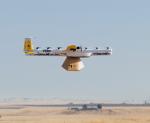Jeff Chiu/AP
- Alphabet announced that Wing and Loon, two projects developed by its X research lab, have now graduated to being full businesses in its "other bets" category.
- The move means the company thinks their technical problems are solved and it's time for them to develop as businesses.
- That's potentially good news for investors, but it's hard to know just what to make of it.
- Collectively, Alphabet's other bets have been losing billions of dollars each year and dragging down the company's earnings.
- But because the company offers no details on the individual results of its other bets companies, it's impossible for outsiders to assess which have potential and which are dogs.
Loon and Wing can no longer be considered loony or wing nut ideas.
Now, whether either of them will ever make any money for parent company Alphabet, or were worth what it invested in them is still anyone's guess.
Google's parent company announced Wednesday that Loon, which is developing a balloon-based internet delivery system, and Wing, which is working on an aerial-drone delivery service, have graduated from X, its research lab. The two projects will now be sister companies to Google, operating as part of Alphabet's "other bets" segment.
That's a significant development. Loon and Wing are just the sixth and seventh X projects to be spun out of the lab as full companies since Google launched X in 2010 — and just the fourth and fifth to join Alphabet's other bets.
According to Alphabet, the move is an indication it believes it's solved the technical problems facing both projects. In their parent company's view, both have now reached a stage of their development where their primary challenge is figuring out how to take their products to market.
"Loon and Wing are ready to take their products into the world," Astro Teller, X's CEO, said in a blog post.
It's hard to know what to make of Alphabet's other betsThat sounds like good news for Alphabet investors. X is basically a cost center for the company. By contrast, the other bets companies at least have the potential to bring in revenue for Alphabet, if not actual profits.
But it's impossible to have any sense from the outside what to make of the announcement beyond the potential for some revenue and the likelihood of more other bets losses. That's because Alphabet discloses little information about its non-Google operations.
It doesn't release the results of any of its individual other bets companies. What's more, the other bets numbers are muddled by the fact that they include not just the results of full-line businesses such as Waymo and Loon, but also Alphabet's investment arms — GV and CapitalG — and X.
What we do know from what Alphabet has released is that the "other bets" companies together are still fairly nascent businesses. Collectively, they posted $1.2 billion in revenue last year, while racking up $3.4 billion in operating losses.
While $1.2 billion in sales is significant, much of that was due to Nest, the home-automation products company that Alphabet took out of its other bets segment and folded back into Google earlier this year.
In the first quarter of last year — the only period for which the numbers can be determined — Nest by itself accounted for about 46% of the $244 million in revenue the other bets businesses collectively posted. But it only accounted for 18% of the $855 million operating loss the other bets businesses recorded.
In other words, Nest was hardly a mature business. But the remaining other bets companies are even earlier in their development than Nest. If they continue at the same pace they were going at in the first quarter, they'll collectively pull in around $600 million in sales this year — and post a $2.3 billion operating loss.
Alphabet doesn't have to break out numbers on any of its other bets — but it shouldIt's precisely because those businesses are so still so nascent that Alphabet doesn't have to break them out individually. None of their results are likely significant when compared with the $109.6 billion in revenue or the $32.9 billion in operating income Google generated by itself last year.
But even if Alphabet doesn't have to disclose more information about their results doesn't mean it shouldn't.
Part of the reason Google transformed itself into Alphabet was to make it easier for investors to see how its core business was performing as compared to its newer business lines. That move has helped shareholders see just how much money Alphabet is plowing into its so-called moonshots and other businesses.
But the move still hasn't given investors the ability to assess whether any of Alphabet's various attempts to diversify beyond its internet advertising business will pay off. There's no way for investors to tell if any of those individual businesses are looking like good bets or if any of them are dogs.
We don't know how much Alphabet has invested into them individually or which ones are starting to promise good returns.
That's an important question for investors, because the other bets businesses racked up nearly $13 billion in operating losses between 2013 and 2017 and they have consistently dragged down its overall results.
So while it's great to see that Loon and Wing have graduated from X, it would be better to know if and when they'll become productive members of Alphabet's collective.
NOW WATCH: These 13 medical technologies are changing lives
See Also:





